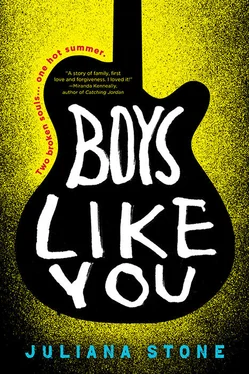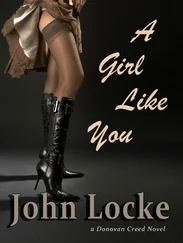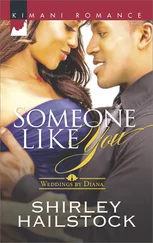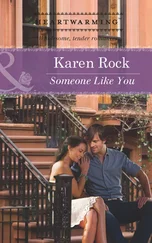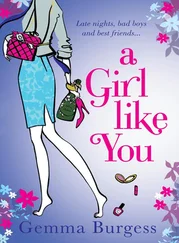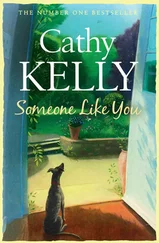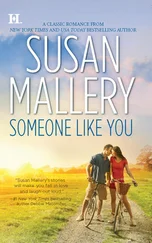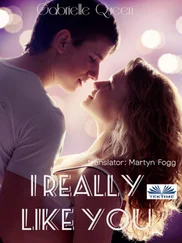Juliana Stone
Boys Like You
This book is for my daughter, Kristen. A young woman with a mind of her own and a love of books that runs in the family. I hope you never change.
Monroe
My gram told me once when I was eleven that I could do anything. She’d been very matter of fact as she poured us each an iced tea on a steamy afternoon.
It was the kind of afternoon when the air sizzled and stuck to the insides of your clothes. The kind of afternoon that made your skin clammy and your muscles lazy. I remember that the birds were quiet but the locusts chimed like mini buzz saws.
Funny, the things that you remember, and the things that you can’t forget no matter how hard you try.
On that particular afternoon, we’d sat on her front porch in the rain, Gram’s hyacinths bent over from the weight of the water, her two cats Mimi and Roger curled at our feet. I’m sure I wore some trendy New York outfit that was totally inappropriate for Louisiana in August, and Gram Blackwell was dressed in what she liked to call “genteel southern attire,” which basically meant cotton instead of linen or silk.
We settled back in our chairs and chatted about the soccer team. I told her how much I wanted to make first string, and she told me that anything was possible as long as I applied myself. Of course I believed her with all the enthusiasm an eleven-year-old who has never been hurt or disappointed feels.
Why wouldn’t I? This was Gram, and she was never wrong.
I tried my hardest and made the team.
But that was before Malcolm. Before the awful year that had just passed. That was before I learned that my charmed life could bleed. That pain could become an everyday kind of thing, and that happiness was just a word that didn’t mean anything.
And now, at the ripe old age of sixteen and a half, I don’t know what I believe in anymore, and I don’t know if I’ll ever be fixed.
It’s not like I haven’t tried.
I went to private therapy. I went to group counseling. I read the books that I was supposed to read, did the relaxation exercises that I thought were stupid, and took the meds that they gave me.
In fact, I loved how those little blue pills made me feel nothing—which isn’t very different from the way I feel most of the time—but medicated nothing is so much better than the real, hard nothing I had been living with.
I suppose it’s why they weaned me off them. “Addict” wasn’t exactly a label my mom wanted to add to the impressive list of everything else that was wrong with me.
My point is…I did it all. I tried.
It’s just hard to succeed at something when you don’t really care, and as much as I want to get better for my parents, I can’t make myself care. Not even for them. My therapist says I need to care for myself first.
And therein lies the problem. The catch-22. I just don’t care anymore. Not really.
Yet there are moments where, if I try real hard, I can close my eyes and smell the rain. Not just any rain, mind you, but that rain. From that long-ago afternoon.
Gram’s rain.
“Monroe, I’m heading to town in a few minutes. Do you want to come along?”
I turned as Gram walked into the kitchen. It was nearly noon and I had been sitting at the table for about an hour, trying to decide if I was going to eat the bowl of pears she’d put out for me earlier or if I was going to put them back in the fridge.
I liked pears. I liked them a lot. I just wasn’t all that hungry.
“Uh, I think I’ll stick around here, if that’s okay with you.”
Gram put her purse on the table, and I pretended not to notice how her eyes lingered on my hair. I’d pulled it back in a ponytail yesterday—or maybe it was the day before—because I couldn’t be bothered with it. I’m pretty sure I hadn’t brushed it since.
She pointed to the bowl in front of me and raised her eyebrows, waiting half a second before grabbing it and setting it on the counter. She pulled plastic wrap from the drawer and covered the pears before putting them back in the fridge.
Gram turned and leaned against the counter, and for a moment, we stared at each other in silence.
I’d arrived a week earlier and we hadn’t had a real chat yet—the one that I sensed was coming—and my stomach churned at the thought.
Gram’s long hair was swept up in a clip at the back of her head, the silver strands glistening in the sunlight that poured in from the window above the sink. She wore pink lipstick, a casual cream skirt—cut to an inch above her knee—a moss-green blouse, and low open-toe heels to finish off the outfit. Pearls were in her ears, and the matching pendant lay at her neck. A classy choice that was totally Gram.
She was beautiful.
My gram had turned sixty last year and still carried that simple elegance that set her apart from a lot of women. She’d been a real hottie in her day, and though my mother said I was her spitting image, I didn’t see it. But then I suppose beauty is more about your state of mind, and since mine was all dark and gloomy, that’s what I saw when I looked in the mirror.
“All right,” she said after a while and glanced at the clock above the stove. “I have someone coming by the house anyway, and I’ll need you to show him where the job is.”
Great. I thought of my bed and the nap I’d planned.
“Who is it?”
I didn’t really care, but I could at least be polite and ask.
“I’ve engaged the services of a local contractor for some repairs and maintenance around the plantation. Today the fence around the family crypt and burial plot will be painted.”
Gram’s ancestors had lived in Louisiana for generations and this place—Oak Run Plantation—had been in the family for just as long. Years ago, Gram’s father had turned the family home into a successful bed and breakfast/museum, which Gram had inherited, because according to my father, Gram’s brother, Uncle Jack, was a no-good drunk who couldn’t find his own butt if he needed to.
My grandmother even stayed on after her husband died, but instead of living in the big house, she moved into what used to be the carriage house. And that’s where I’m staying this summer.
Everyone—which would be my parents and my best friend Kate—was hoping the hot Louisiana summer and laid-back atmosphere would somehow fix me. They think that the city and the memories are too much, and I don’t have the heart to tell them that the memories will never leave. That much I’ve learned.
So location doesn’t really matter, but I was glad to be away from my mother and her large, expressive, puppy-dog eyes. She looks at me a lot when she thinks I won’t notice, and every time she does, I feel like the biggest failure on the planet.
I don’t know how to react to her anymore—do I pretend I’m better to make her pain go away? Do I ignore her? Do I tell her to get out of my face?
And my father, God, he’s the total opposite. He acts as if everything is normal. As if the last year and a half never happened—as if each one of us is whole—and that makes me angry. And kinda sad.
Gram grabbed her purse, bent low, and gave me a hug. “I love you, Monroe.”
“I know,” I whispered.
She grabbed her keys and paused. “Barbecue sound good for supper?”
I shrugged. “Sure.”
“All right then.” She moved toward the door but paused, her hand on the ivory handle. “He’ll be here in an hour. Why don’t you brush your hair?”
“Okay,” I answered, though I’m pretty sure we both knew it wasn’t likely to happen.
Nathan
The crap thing about not being able to drive is that I do a lot of waiting around for rides, and I hate waiting. Doing nothing makes me crazy, and crazy Nathan isn’t exactly the kind of thing I’m going for these days.
Читать дальше
